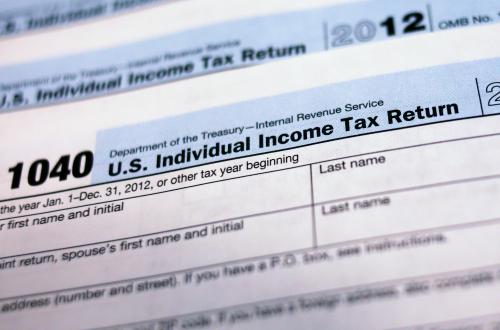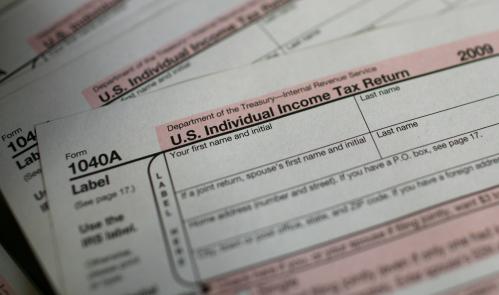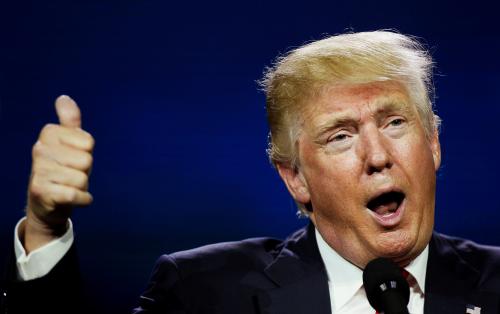This week Senators Ted Cruz of Texas and Bernie Sanders of Vermont faced off in a heated debate on a pressing policy issue. In February, the Senators talked health care; this week it was tax reform’s turn. Once again, it was a discussion that managed to be contentious but also—remarkably—policy-focused. Moreover, the debate raised important questions about how the parties will define themselves going into 2018 and 2020. If you missed it, here are the three things to know.
1. Trump, who?
Trump was mentioned a total of 16 times during the debate, mostly by the moderators. As a point of comparison: former President Obama was mentioned 36 times, by my count. Most notably, Senator Cruz appears to have avoided saying Trump’s name at all.
Thus the debate had the feeling of occurring in a parallel universe, one that branched off from ours some time in early 2016. In the debate timeline, the president might be named “Rubio” or maybe even “Bush.” In this world, Republicans are still pushing enormous top-heavy tax cuts, but the most dangerous and nonsensical claims a politician makes are about the Laffer Curve.
It was sort of relaxing, in a way, to have a little vacation from the madness of 2017, but it was also pretty bizarre. The president is not the Candyman, summoned by his name’s repetition. Nor is he Tinkerbell; he does not cease to exist if you do not believe in him.
It will be interesting to see if this strategy of omerta becomes a more widespread phenomenon, where Trump becomes a sort of elephant in the room that Republicans ignore when they want to talk about economic policy. The challenge, of course, is that Republican economic policy does not motivate Republican voters—Trump’s explicit ethno-nationalism does.
2. The Republican tax plan still relies on fairy dust.
Republicans continue to insist that the tax-cut straw will be transmogrified into gold—or at least, jobs. That tax cuts for corporations and the wealthy do not in fact spur job growth has been demonstrated for literally decades—so long now, that it has been thirty-seven years since George H.W. Bush called trickle-down supply-side theory “voodoo economics.” At this point it’s more like zombie economics, a terrible idea that just won’t die. And yet, here we are.
Though the Republican tax plan is unsurprising in its economic implications, it is a strange political choice. Traditionally, Republicans have promoted their vision of the economy with a straightforward appeal: more money in your pocket. As Cruz put it, “Republicans want to lower the taxes for each and every person watching this debate.” This promise of a broad-based tax reduction likely helped pass the Bush tax cuts in the early 2000s. But under the 2017 Trump-GOP tax plan, some middle-income people would see a tax increase. Perhaps one of the most interesting aspects of the current tax debate is the Republicans’ decision to try and pass tax cuts for the wealthy without a clear across-the-board tax reduction. Instead, the Republicans have linked their tax cuts to budget cuts in popular social programs, including Medicaid and Medicare. Republican Party policies seem to be increasingly unmoored from any strategy that involves accruing popular support.
3. The Democrats still have not figured out their diagnosis on the economy.
Republicans have the virtue of consistency in economic messaging—witness Senator Cruz breaking out the classic, “My solution is more freedom and less government.” The Democrats, by contrast, continue to struggle to define their vision of the government’s role in the economy. This failure was evident in the debate last night.
Cruz hit Sanders on what should have been his comfortable ground; the Republican referred to how high income inequality remained during the Obama Administration, claimed that Democrats support “corporate welfare,” and emphasized the role that wealthy donors play in Democratic Party fundraising. Sanders struggled to respond, presumably because these are critiques he basically agrees with, even if he thought Cruz was making the case insincerely.
Moreover, Sanders seemed far more comfortable emphasizing the need to raise taxes on the rich, rather than defend the taxes necessary to fund the big-ticket universalist programs he promotes. It was only late in the debate, when asked explicitly by the moderator Jake Tapper whether Americans were willing to pay more in taxes, that Sanders actively defended raising taxes on middle-income families, explaining the concrete benefits—health care, college tuition, and child-care—they would receive in return. A vital question in the coming years is whether Democrats re-learn how to promote big social programs paid for with broad based taxes; my own research suggests such a strategy would have broad appeal.
This week we saw a policy debate frozen in time. Perhaps this only makes sense, given that both debaters probably recall early 2016 rather fondly, back when they were both contenders for their respective parties’ presidential nominations. But the debate revealed just how far both the Democrats and the Republicans will have to go to come to terms with the world we live in now.
The Brookings Institution is committed to quality, independence, and impact.
We are supported by a diverse array of funders. In line with our values and policies, each Brookings publication represents the sole views of its author(s).











Commentary
Three takeaways from the Cruz-Sanders debate
October 20, 2017